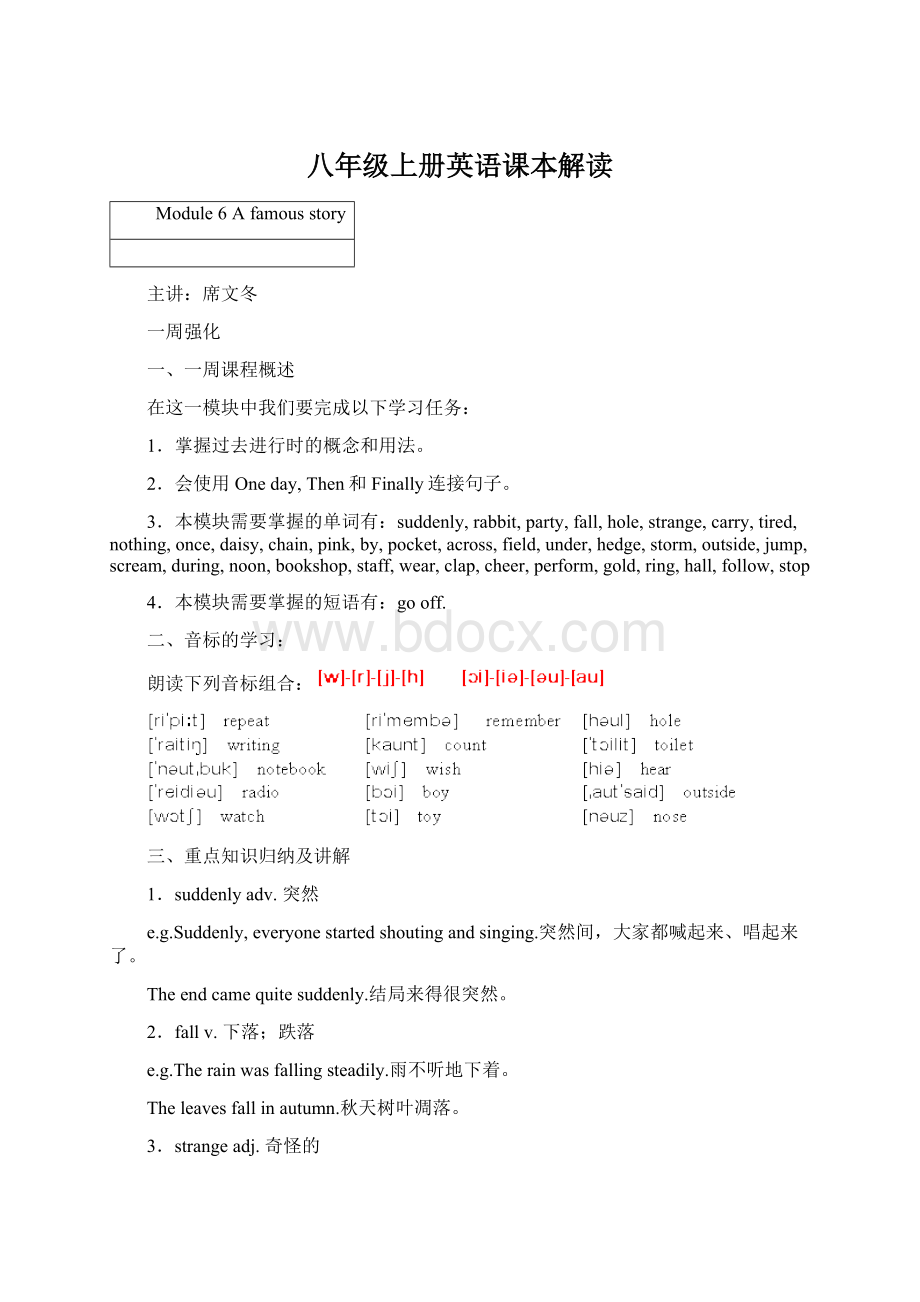八年级上册英语课本解读.docx
《八年级上册英语课本解读.docx》由会员分享,可在线阅读,更多相关《八年级上册英语课本解读.docx(56页珍藏版)》请在冰豆网上搜索。

八年级上册英语课本解读
Module6Afamousstory
主讲:
席文冬
一周强化
一、一周课程概述
在这一模块中我们要完成以下学习任务:
1.掌握过去进行时的概念和用法。
2.会使用Oneday,Then和Finally连接句子。
3.本模块需要掌握的单词有:
suddenly,rabbit,party,fall,hole,strange,carry,tired,nothing,once,daisy,chain,pink,by,pocket,across,field,under,hedge,storm,outside,jump,scream,during,noon,bookshop,staff,wear,clap,cheer,perform,gold,ring,hall,follow,stop
4.本模块需要掌握的短语有:
gooff.
二、音标的学习:
朗读下列音标组合:
三、重点知识归纳及讲解
1.suddenlyadv.突然
e.g.Suddenly,everyonestartedshoutingandsinging.突然间,大家都喊起来、唱起来了。
Theendcamequitesuddenly.结局来得很突然。
2.fallv.下落;跌落
e.g.Therainwasfallingsteadily.雨不听地下着。
Theleavesfallinautumn.秋天树叶凋落。
3.strangeadj.奇怪的
e.g.It'sstrangethatwehaven’theardfromhim.奇怪的是我们没有他的音信。
instrangecountry,town,etc.在陌生的国度、城市等
4.carryv.携带;拿着;抱着
e.g.Shecarriedherbabyinherarms.她怀抱着婴儿。
Policeinmanycountriescarryguns.许多国家的警察都带枪。
Inevercarrymuchmoneywithme.我身上从来不多带钱。
5.tiredadj.劳累的
e.g.She'ssotiredthatshewantstogotobedearly.她太累了,以致于她想早点休息。
Don'tbetootired.不要太累了。
6.nothingpron.没有什么;没有东西
e.g.It'snothingserious.不太严重。
Thereisnothinginterestinginthenewspaper.报纸上没什么有趣的新闻。
注意:
当形容词修饰nothing等不定代词时,要放在其后。
e.g.Ihavesomethingimportanttotellyou.我有一些重要的事情要告诉你。
7.onceadv.一次;曾经
e.g.I'veonlybeenthereonce.我只去过那里一次。
Hecleansthecaronceaweek.他一星期擦一次车。
Ioncemetyourmother.我曾经见过你的母亲。
HeoncelivedinBeijing.他一度住在北京。
8.acrossprep.越过
e.g.Canyouswimacross?
你能游过去吗?
Comeacrosstomyofficethisafternoon.你今天下午到我办公室来一趟。
(comeacross)
walkacrossthestreet走过这条街
9.outsideadv.在外面
e.g.It'srainingoutside.外面在下雨。
It'swarmeroutsidethaninthisroom.外面比这间屋子里暖和。
10.wearv.穿;戴
e.g.wearacoat,hat,ring,watch,etc.穿大衣、戴帽子、戴戒指、戴手表等
Shewaswearingsun-glasses.她戴着墨镜。
Sheneverwearsgreen.她从来不穿绿色的衣服。
11.performv.表演;施行
e.g.performatask,one'sduty执行任务、履行义务
Theyareperforminghispianoconcertotonight.他们今晚演出他的钢琴协奏曲。
12.stopv.停止;停下
e.g.Pleasestoptalking.不要讲话了。
Pleasestoptohavearest.请停下来休息一下。
注意:
stopdoingsth.和stoptodosth.的用法和区别。
13.gooff(灯)熄灭;停(电)
e.g.Suddenly,thelightwentoff.突然停电了。
14.Onceortwiceshelookedintohersister’sbook,butithadnopicturesorconversationsinit.
[译文]她看了几眼姐姐的书,发现书上既没有插图又没有对话。
onceortwice意思是“几次,一两次”。
例如:
Shegoesswimmingonceortwiceamonth.她一个月去游一两次泳。
15.“Andwhatisabookfor,”thoughtAlice,“withoutpicturesorconversations?
”
[译文]“没有插图、没有对话的书有什么用?
”爱丽丝想。
What…for?
表示“为什么……?
”例如:
—I’mgoingtoParis?
我要去巴黎。
—Whatfor?
(=WhatareyougoingtoParisfor?
) 去做什么?
16.Soshewasthinkingofmakingadaisychainwhensuddenlyawhiterabbitwithpinkeyesranbyher.
[译文]她正在想着做一个雏菊花环,突然,一只粉色眼睛的小白兔从她身边跑过。
bedoing…when…表示一个动作在进行,另一个动作又发生了。
例如:
Theywereworkinginthefieldswhenitbegantorain.
他们正在田里干活,这时天开始下起雨来。
daisychain是西方孩子们用雏菊梗和花编成的一个圈,可戴在头上、挂在颈上或墙上。
四、语法点拨:
过去进行时
1.过去进行时的定义
过去进行时常表示过去某一时刻或过去某一阶段内正在进行的动作。
2.过去进行时的构成
过去进行时是由“be动词的过去式was/were+现在分词”构成。
3.过去进行时的基本句型
肯定式
疑问式
否定式
Iwasworking
Wereyouworking?
Iwasnotworking
He/She/itwasworking.
Washe/she/itworking?
Yes,he/she/itwas.
No,he/she/itwasn’t.
He/she/itwasnotworking.
Wewereworking.
Wereweworking?
Wewerenotworking
Youwereworking
Wereyouworking?
Youwerenotworking
Theywereworking
Weretheyworking?
Theywerenotworking
4.过去进行时的基本用法
(1)过去进行时表示过去某一时间正在进行的动作,常和表过去的时间状语连用,如:
Iwasdoingmyhomeworkatthistimeyesterday.昨天的这个时候我正在做作业。
Theywereexpectingyouyesterday.他们昨天一直在等待。
(2)过去进行时可与soon,thenextmoment,inminutes,minuteslater等时间状语连用,表示一个新的动作刚刚开始。
如:
Soonthewholetownwastalkingaboutit.不久镇上的人就都谈论起这种事了。
(3)过去进行时可用来申述原因或用作借口,这种用法常用在口语中。
如:
—Haveyoufinishedyourhomework,Mary?
玛丽,你作业做完了吗?
—No,Iwashelpingmymotherinthekitchenalldayyesterday.
还没呢,我昨天一天都帮妈妈在厨房干活。
(4)过去进行时可用来为一个后一系列动作的发生提供背景。
如:
IhurtmylegwhenIwasridingabike.我在骑车时把腿摔坏了。
(5)过去进行时可表示过去未曾实现的愿望或打算,这时be动词was/were要重读。
如:
Iwaswritinghimaletterthismorningandforgotallaboutit.
我本该今天早上给他写信的,后来全给忘了。
Iwasseeinghertomorrow.我本来打算明天会见她。
Hewaswatchingtheplayyesterday,buthewastoobusy.他昨天本来要看那场戏的,可是太忙了。
注意:
常用的时间状语有thismorning,thewholemorning,alldayyesterday,fromninetotenlastevening,when,while
e.g.Mybrotherfellwhilehewasridinghisbicycleandhurthimself.
Itwasrainingwhentheyleftthestation.
WhenIgottothetopofthemountain,thesunwasshining.
5.一般过去时和过去进行时的区别
(1)一般过去式常表示在过去某时发生的动作或存在的状态(包括过去习惯动作),常与一般过去时连用的时间状语有justnow,amomentago,yesterday,lastweek(month,year),thedaybeforeyesterday及表示过去的时间状语从句。
如:
Iwassixteenyearsoldlastyear.我去年16岁。
Heworkedinafactoryin1986.他1986年在一家工厂工作。
Imetherinthestreetthedaybeforeyesterday.前天我在街上遇见了她。
Heoftenswamintheriverwhenhewasyoung.他小时候常在河里游泳。
(2)过去进行时表示过去某一段时间或某一时刻正在进行的动作。
常与之连用的时间状语有,atthattime/moment,(at)thistimeyesterday(last